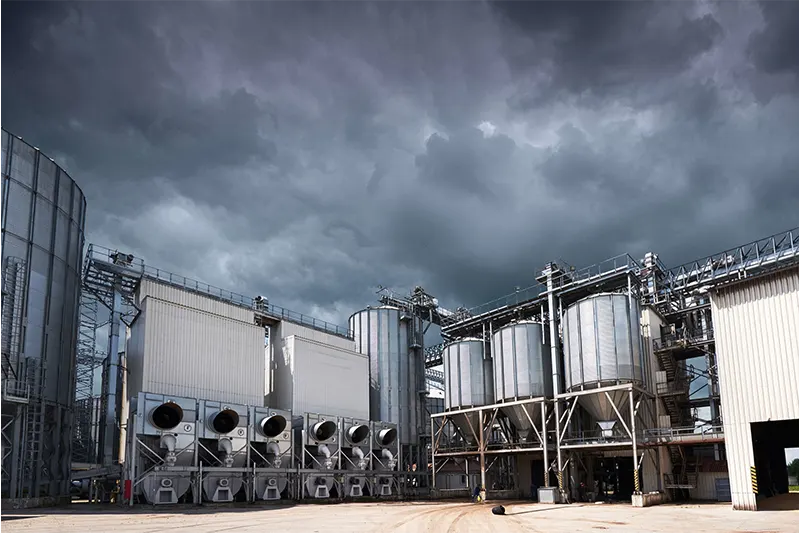Is your facility Monsoon Ready?
India being a tropical country has a heavy monsoon season from June to October. Although the monsoons bring much-needed relief from the scorching summer heat, it also brings risks related to safety, especially at industrial sites. It is essential for all Industrial sites to take precautionary measures to prevent any damages or hazards that the rains, thunder, lightning, and storms could cause.

Checklist for Pre-Monsoon Safety Measures
FFS, being an integrated facility management service provider, we have created a Pre-Monsoon Precautions Checklist for your Industrial Site:
Raw Materials are in Protected Storage
For any industrial facility management, unchecked water can be devastating. It’s bad enough in any commercial or industrial premises, but when it comes to the warehouse, the stakes are even higher. The damage can be far more extensive when you take into account stored raw material inventory. One of the most at-risk parts of any warehouse is when leaked water comes in direct contact with water-reactive chemicals as it can release toxic gases or lead to a fire outbreak in the facility. Hence, all such storage must be thoroughly checked for leaks from flanges, joints, instruments, wiring and piping so that rainwater droplets do not enter the storage area.
Check for Damages or Leakages
When water enters the facility, it not only leaves stains and damages the paint, plaster, ceiling-mounted lights and several other items but it can also disrupt business operations even from a small or large roof leak depending on the leak locations that may damage materials, equipment and halt the factory operations resulting into potential shut down. Hence, the roofs of the facility must also be tested for any pinhole leakages prior to the monsoons as a part of a preventive monsoon maintenance plan.
Take Pest Precautions
Pests like insects and rodents can also cause significant damage to manufacturing facilities during the rainy season. They can gnaw electrical wires and clog pipes. However, stagnant water serves as a breeding ground for mosquitoes. Always look out for stagnant water near your factory premises, and try to get rid of it immediately before it attracts pests & insects and if possible consult a professional pest control service provider to effectively address and prevent pest infestations.
Check Loose Electrical or Wiring
One of the most at-risk parts of any industrial unit is when water enters the electrical system. The risk of electric shocks increases considerably during monsoon season due to water seeping into electrical components. If you need to use them while it’s raining, always double-check that they are functioning correctly in advance and wear insulated gear to protect you from electric shock.
Check, Protect Transformers or DG Sets
A generator set is a reliable piece of equipment that can provide continuous and backup power all year round. But if you’re operating it during the rainy season, you might need special covers when running it outdoors. Another way to keep your generators safe from moisture is to use a steel enclosure made for outdoor applications. You can also make a concrete pad to keep your generator set away from standing water.
Roof checks for Lightning Protection
Roof lightning protection systems are essential to protect facilities from lightning. The facility is at risk if lightning strikes a building that doesn’t have protective systems installed. There are different lightning protection systems available, many with custom elements that can meet your facility building’s specific needs. This lightning interception system creates a preferred strike point for lightning and safely runs the energy to the ground to spare the building and the people working inside.
Excess Water and Drainage Management
It is of utmost importance to have an efficient draining system in the industrial area to channelize the excess rainfall water that can safely be drained away from the manufacturing facility. No matter the type of industry, many difficult issues can be solved with a proper drainage solution. Without proper drainage, equipment, products, and even employees are at risk for harm. Such situations can be avoided by choosing one of the top drainage solutions for industrial use in your manufacturing facility or warehouse.
Kitchen Garden Preservation
Gardening on rainy days is surely fun and relaxing but also challenging. During rainy days, plants kept outdoors in pots receive plenty of water. The plant could die if you don’t drain the excess accumulated water out of the pot. To prevent this, check the drainage holes and ensure that there are no clogs. If you have planted several pots together, move them around, so they get enough sunlight. During rains, the soil gets compacted. So, loosen up the dirt by digging it up and adding compost. It will help to retain moisture.
Landscape Protection
Water brings life to gardens, but excessive rainfall cause harm to horticulture/landscape gardening . When the rains are too heavy and are accompanied by a strong wind, then they are protective to the plants. It is important to ensure that your garden has a good drainage system whether you have indoor plants or an external landscape garden area. An efficient drainage system is really important during the monsoon season.
